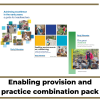DfE launches school-based nursery pilot
The Department for Education (DfE) has today launched a “test and learn” pilot for its planned expansion of school-based nursery provision. Under the scheme, primary
A survey of maintained nursery schools carried out by Early Education in June 2021 has found increasing demand from children with SEND in the current school year, or for September entry. However, funding constraints were expected to affect most schools’ ability to support children with SEND in due to additional funding for children with SEND having reduced or being harder to obtain (41%), staff cuts being made as a consequence of schools’ wider financial difficulties (36%) and cuts made by local authorities to funding for specialist provision/reserved places/assessment centres (17%). Only just over a quarter (26%) of schools said their ability to accept children with SEND was unaffected by funding constraints in the current or next school year. Even those who were able to accept as many children with SEND warned that funding constraints were having an impact on quality or that they had taken a decision not to turn away children with SEND despite the impact on staff.
The situation was summed up by one respondent as follows:
A real value reduction in our overall funding means that we have had to reduce our overall staffing budget. This, coupled with the difficulty of acquiring LA funding for individual children with SEND, will mean that we are unable to accommodate the same number of children that we have historically, We know that there are a significant number of children with SEND in our locality that other EY settings have not been able to accommodate due to the complexity of their needs. Previously, we have been able to accept a good number of these. However, we are unlikely to be able to manage this safely this coming year so will have to restrict the number of spaces we will be able to offer.
Maintained nursery schools have high levels of expertise in supporting children with SEND and the proportion of children with SEND whom they support is well above the sector average. They also tend to admit children with complex needs whom other settings are unable to support. However, the financial impact of the pandemic, on top of long-term underfunding, is threatening their capacity to continue this vital work, raising the risk of increasing the number of children with SEND unable to secure a suitable early years place. At the same time, headteachers reporting rising numbers of children with SEND who have additionally been impacted by the pandemic, creating greater pressure on an early years system which has long struggled to provide enough places for children with SEND. Staffing cuts and deficit budgets are reducing their flexibility to provide the support needed for children with SEND.
The findings of the survey are being launched at a meeting of the All Party Parliamentary Group on Nursery Schools, Nursery and Reception Classes on 6 July, which will be hearing about the role of maintained nursery schools in supporting post-pandemic recovery and the levelling up agenda.
Early Education’s Chief Executive, Beatrice Merrick, said:
Government’s failure to put in place adequate funding for maintained nursery schools is eating away their capacity to support the most vulnerable children. Fewer children with SEND having the high quality early childhood education and care they need will impacts on their life chances. It will mean increased costs for the Exchequer when early intervention opportunities are missed, and will have knock-on effects for the primary and special schools as children move on to the next phase.
Jack Dromey, Member of Parliament for Birmingham Erdington, and Secretary for the All-Party Parliamentary Group on Nursery Schools, Nursery and Reception Classes, said:
During the pandemic, a whole generation of our country’s children has been deprived of the education their parents expected and their children deserved. The role of our state-maintained nursery schools, the jewel in the crown of our early years provision, has never been more important. The failure to address their funding needs has had a detrimental impact on children with high needs in particular. If the Government is sincere in its commitment to levelling up opportunities across the country, with support for SEND children at the heart of this agenda, the long-term funding issues must now be addressed. Action is urgent and we look for firm commitment in the forthcoming Comprehensive Spending Review.
Early Education (The British Association for Early Childhood Education) is the leading independent national charity for early years practitioners and parents, campaigning for the right of all children to education of the highest quality. Founded in 1923, it has members in England, Northern Ireland, Scotland and Wales and provides a national voice on matters that relate to effective early childhood education and care of young children from birth to eight. The organisation supports the professional development of practitioners through publications, training, conferences, seminars and access to a national and regional branch network. For more information on the work of Early Education visit www.early-education.org.uk
The Department for Education (DfE) has today launched a “test and learn” pilot for its planned expansion of school-based nursery provision. Under the scheme, primary
Ofsted has today published its response to the “Big Listen” consultation. For the early years, it undertakes to: On the differences between early years and
We welcome the Department for Education’s announcement that the government are moving ahead with their manifesto commitment to scrap single-word Ofsted judgements for schools, effective immediately,
On 10 June, Labour announced their plans for “over three thousand new nursery classes across England to open up access to childcare hours for families”,
The Conservative Manifesto has promised to extend Family Hubs to all local authorities. This would both extend funding for the 75 local authorities where they
The Lib Dems have published their manifesto, including commitments to incorporate the UN Convention on the Rights of the Child into UK law and to
A report published by the National Audit Office (NAO) today finds that the timetable for the roll-out of the new funded early education and childcare
A new campaign to boost recruitment to the early years sector in England is being launched today by the government. The government press release says:
The Department for Education has today published its response to the EYFS consultation conducted in the summer. The changes will be implemented from January 2024
DfE has today launched a consultation on the new funding rates which will apply for 2-year-olds and under 2s when the new entitlements are introduced
The Department for Education has today announced that the extra £204m for early years announced in the budget will be allocated to local authorities as
In a speech today, Kier Starmer will set out Labour’s plans to expand opportunity via five “missions” including “Early years reform – to boost child development with an
The Department for Education (DfE) is currently consulting on proposals to amend the Early Years Foundation Stage. They propose relaxing the requirements around the minimum
DfE has issued slightly more detail about the planned uplift in the hourly rates for the current and new entitlements, following the announcements in the
Today, teachers from the National Education Union are striking, including many working in nursery and reception classes. In the last week, the Department for Education
We welcome the news that our President, Professor Cathy Nutbrown, has been made a Dame in the year’s New Years Honours list. This is much
The government’s latest changes to the early years funding formulae bring two key changes which we pointed out in our response to the consultation would
DfE have today announced the early years funding settlement for 2023-24, which leaves the early years sector struggling on below inflationary increases. While an additional
Ofsted’s latest annual review highlights the impact of recruitment and retention challenges and finds a link between inspection outcomes and the proportion of graduates in
The tenth early years minister in ten years, Kelly Tolhurst, is now in post. It’s good news that early years is part of a Minister
Comparing figures from January 2022 and January 2020, progress is being made towards previous levels of take up of funded early education. Latest figures from
Early Education welcomes the news that the new National Plan for Music Education has been extended to cover the early years. We are glad to
The Times Education Commission has today published a report which calls for “A significant boost to early years funding targeted at the most vulnerable and
Cathy Nutbrown, President of Early Education The twelve sessions of the May Annual National Conference 2022 left me reflecting on a strong thread which I
Ofsted has today launched a new five-year strategy. Elements of this which affect the early years include commitments to “simplify the regulatory regime for childminders”
We welcome the government’s new Sustainability and climate change strategy for education and children’s services, and that early years is reflected through a range of
The DfE have issued documents to support schools and settings to understand how to report to the Early Years Census in the context of the









Early Education
2 Victoria Square
St Albans
AL1 3TF
T: 01727 884925
E: office@early-education.org.uk